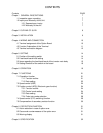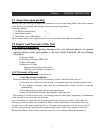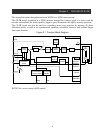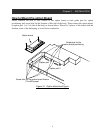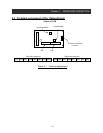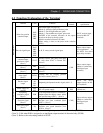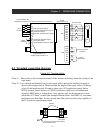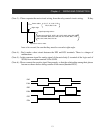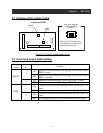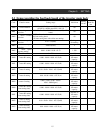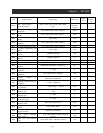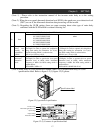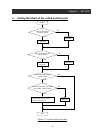
11
Chapter 4 WIRING AND CONNECTION
4.2 Function Explanation of the Terminal
Terminal Code Function
Common
terminal
electric
specification
Pulse line position
command input
SAP
SAN
SBP
SBN
Pulse train input (see page 16)
•Mode 0 : 90 degree phase difference pulse
•Mode 2 : Forward pulse/Reverse pulse
•Mode 1 : Forward/Reverse signal, pulse train
ON/OFF of the terminal resistance on the option
board can be done by the dip switch.
(Built in terminal resistance 150 ohm)
Mode setting is done at the pulse mode selection
(P013)
DC5V receiver input
(based on RS-422
standard)
Encoder signal input
EAP
EAN
EBP
EBN
EZP
EZN
A, B, Z: rotary encoder signal input
Photo coupler input
(Correspondence to
the DC5V line driver
type rotary encoder)
Pulse train position
command input
permission signal
(Note 1)
STAT
Position control with pulse train input
is valid when STAT is Turned ON.
(Note 3)
Orientation signal:
(Note 1)
ORT
Turning ON for orientation operation.
(Note 3)
LAD cancel signal:
(Note 1)
LAC
Turning ON for canceling LAD.
(Note 3)
Input terminals
Position deviation
clear signal:
(Note 1)
PCLR
Turning ON for clearing position
deviation counter. (Note 3)
CM1
Photo coupler input
(Refer to a main body
intelligent input
terminal.)
Encoder signal
output
AP
AN
BP
BN
Outputting the Inputted encoder signal (ratio 1:1).
DC5V line driver
output (based on RS-
422 standard)
Power supply for
encoder
EP5
EG5
DC +5V power supply EG5 150mA max
Positioning
completion signal
(Note 2)
POK
Used for position control or orientation.
Output when the subject comes within
the specified range (P017). (Note 3)
Speed deviation
excessive signal
(Note 2)
DSE
Output when the real rotation speed
deviates over from command speed
(P027). (Note 3)
Output terminals
Zero speed signal
(note 2)
ZS
Output when the real rotation speed
becomes zero speed detection level
(C063). (Note 3)
CM2
Open collector outputs
(Refer to a main body
intelligent input
terminal)
(Note 1): Valid when LAC is assigned to an intelligent input terminal of the main body (SJ300).
(Note 2): Valid when POK is assigned to an intelligent output terminal of the main body (SJ300).
(Note 3): Refer to the code setting method of SJ300






